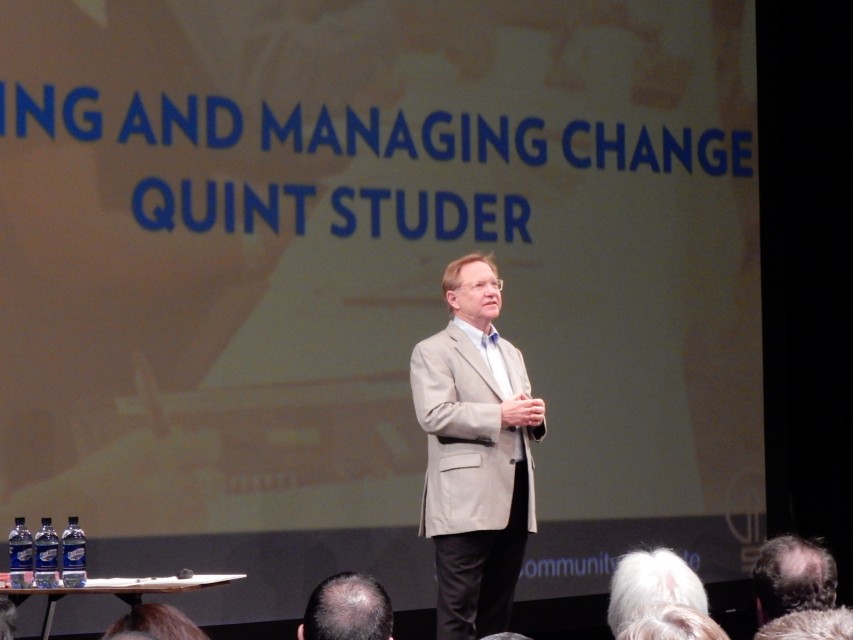SCI TRAINING: Don't let change create anxiety
- March 1, 2016
- / Reggie Dogan
- / studer-community-institute

Ambiguity is the enemy of change.
In a company or organization, the smallest change can have a big impact if the people affected aren't made aware of it. That's why it's so important to explain any change — big or small — to decrease rather than increase anxiety among employees, Quint Studer believes.
"If you’re changing your behavior, even if it’s positive, let the people know that you are changing your behavior," said Studer, founder of Studer Community Institute. "Even good behavioral change can scare people."
Studer, on his first day as a “full-time volunteer for the community,” spoke to more than 500 people at a free community workshop at WSRE Jean & Paul Amos Performance Studio.
The workshop, "Leading and Managing Change," is part of the Studer Community Institute’s ongoing development sessions to help improve the quality of life in Northwest Florida. As an independent nonprofit organization, the Institute relies on the support and engagement of people and organizations to help achieve its mission.
Community training workshops that help small businesses and nonprofits gain these skills and improve their function are a key component of the Institute's mission to improve the quality of life and the climate for entrepreneurs.
Studer told the audience that the best leaders create an environment of consistency so that a company or organization can operate smoothly no matter who is in charge.
"If everybody learns the same techniques you have consistency," said Studer. "Ever notice that when a football team huddles, they all huddle. You don’t have one or two players on the outside."
It's also important, Studer says, not to be a "park ranger" leader.
When you always provide the way out of confusion for your employees, you may unwittingly send the message that the answer will come to you if you wait — rather than encouraging people to find their own way out of the forest.
"People who get promoted are people who bring solutions," Studer said. "When someone comes to you with a problem, don’t give the answer. Say what do you think we should do? If you give the answer, you given a solution, you haven’t developed the person."
That can be one of the hardest lessons for a leader of any organization to embrace.
"Holding up the mirror and self-assessing is the most important skill set a leader can have," Studer said.
Attendees heard insights on ways to better handle change in their own role, as well as guiding others to do the same.
The workshop focused on increasing the understanding of the various aspects of organizational change and effective strategies to insert a sense of urgency, lead through the process and minimize resistance.
No matter what it is, people don’t like change, Studer said. How you get people through that unsettling time is a mark of a good leader.
"If you can’t explain the why, why the change, we won’t get them there," Studer said.
Core principles of leading change for individuals and organizations include the three-part framework for change:
1.Direct the rider
— Look for bright spots.
— Start small. Little change can have large impact.
— Show a clear path; remove the fog to direct the rider.
2.Motivate the elephant
— Respond to felt need. It is the felt need of the person that matters.
— Find the what. Speak to the emotion, not just information
3.Shape the path
— When the path changes, people change.
— Tweak the environment to make change easier.
Leading people isn’t soft skills, Studer said.
"People skills are hard, and the idea separating the personal and the professional is a myth, Studer said. ‘Whoever came up with that is wrong.”


 CivicCon launches with a look at good growth in cities
CivicCon launches with a look at good growth in cities
 Building stronger brains one baby, one parent at a time
Building stronger brains one baby, one parent at a time
 SCI debuts commercial on Early Learning City
SCI debuts commercial on Early Learning City
 Entrecon: World class speakers and an opportunity to sharpen skills
Entrecon: World class speakers and an opportunity to sharpen skills
 PYP Quality of Life survey 2017
PYP Quality of Life survey 2017
 EntreCon Pensacola 2016: A look back
EntreCon Pensacola 2016: A look back
 Leadership tip: getting better employee takeaways
Leadership tip: getting better employee takeaways
 Leadership tip: be interested instead of interesting
Leadership tip: be interested instead of interesting
 Leadership tip: delivering difficult messages
Leadership tip: delivering difficult messages
 Brain Bags boost Arc, Early Childhood Court programs
Brain Bags boost Arc, Early Childhood Court programs